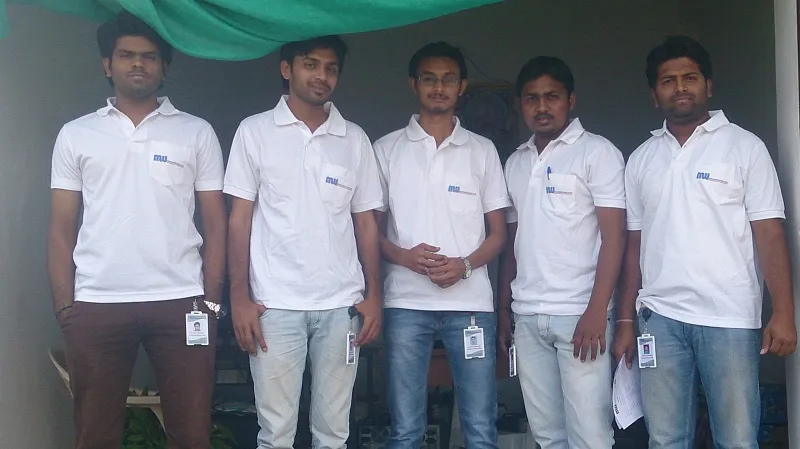How two 23 year olds built a profitable e-commerce platform in Amravati
Vidharbha, a region infamously known for the worrying number of farmer suicides, is taking baby steps towards creating an online marketplace for groceries with MarketWarket in Amravati. Started by two 23-year-old engineering students, Prashanth Mahalle and Pushpak Deshmukh, MarketWarket was born out of Pushpak’s desire to have someone deliver groceries at his doorstep.
Born in a village, the duo come from an agricultural background. Prashanth says that he met Pushpak during their first year in engineering and they bonded over the entrepreneurial passion they shared. An idea, however, was born only in 2011, when Pushpak found grocery shopping inconvenient and time consuming. He wondered how it would be if groceries were delivered at his doorstep, within a short period of time.
Beginnings of a new idea
Former President A.P.J Abdul Kalam instilled in Pushpak a desire to pursue entrepreneurship during a function at the duo’s college, where he was a chief guest. He began working on a hyper-local platform for all services like HouseJoy–a home services company - and on an e-commerce platform. When he went to TIE Nagpur – an organization for encouraging entrepreneurship - for mentorship and guidance, Pushpak was told that these things were impractical and these fields can never exist.
Nevertheless, Pushpak discussed the idea with Prashanth, who got on board immediately. In those days, Prashanth says that e-commerce was gaining great traction in the country. This got the duo thinking: "Why to wait for someone to deliver grocery at our home? Why should we not do it ourselves?” “This is how MarketWarket was born," he adds.

Building blocks
At the time of their launch, there was not a single e-commerce website in the region. Also, there were several challenges in the day-to-day lives of the common man. People of the Vidharbha region of Maharashtra were struggling for electricity, drinking water, employment and there also was the growing issue of farmer suicides.
Speaking of how they spread the word about their platform, Prashanth says the local Marathi language came of help. They used ideas like autorickshaw banners, co-sponsoring local cultural events, distributing flyers and door-to-door promotion tactics to land several new orders.
Roadblocks
However, building an e-commerce platform in Amravathi was wrought with its own challenges. Prashanth says that there was this general distrust and people often met ask questions on their products – whether they were stolen or expired. He adds, “Many suspected we did not pay our taxes because we offered discounts and free delivery”.
Additionally, while tying up with FMCG companies, it was hard to convince local company distributors to supply goods as, in 2012, the concept was new for them. “It was definitely a struggle to establish a balance between product quality and price comparison point from our side,” Prashanth says.
Maintaining a supply chain to deliver a wide range of products on time at competitive prices involves considerable operational complexity. "Grocery items are a low margin category, without much scope for large discounts,” notes Prashanth. "We are aware that MarketWarket is not growing rapidly like other big players, but we are making footprints of e-commerce in a region like Vidarbha. We already have 95 per cent returning customers, which is a victory for us," Prashanth adds.
Since mostly youngsters used Internet and social media, it took awhile for e-commerce to penetrate in the region. Even today, there is a deep distrust towards online payment and almost everyone goes for cash on delivery payment option.
Nevertheless, he says, there are several reasons to start e-commerce in the region which include low expenses, inexpensive manpower, small cities (with concern to delivery and marketing costs) and high customer loyalty. "With accurate planning and accomplished sales target, startups can be profitable here," he says. The number of registered customers till date are 1500, and the average amount of an order is Rs.1450.
Market and future plans
The team currently is looking for funding to scale operations. It is looking at an experienced team of investors to help achieve its plans and vision. According to Prashanth, unlike even the bigger players, the team works on delivering within three hours. "We have complete control over products. They are packed by us and that helps keep a check on quality," he adds. The team currently follows an inventory-based, warehousing model.
The duo is next planning to develop an app soon. "As we are also from agricultural background, we have planned to help farmers by integrating them directly for staple food and other items," Prashanth says.
E-commerce in Tier II and Tier III cities
With the Indian e-commerce market poised to touch USD six billion by the end of the year, it's no surprise that several Tier II and Tier III cities are joining the race. With the increasing breadth of Internet and Smartphone reach in the country, the penetration of e-commerce is believed to grow at close to 51 per cent, even in several deep pockets. As of 2013, there were close to 21 million active mobile users in rural India.







